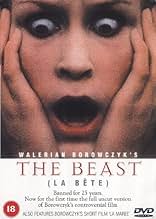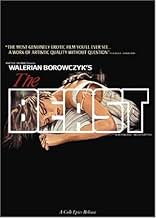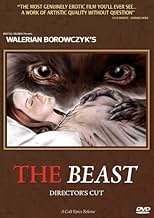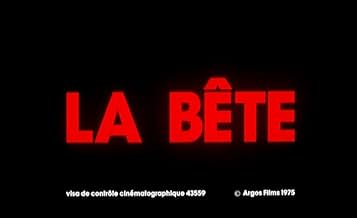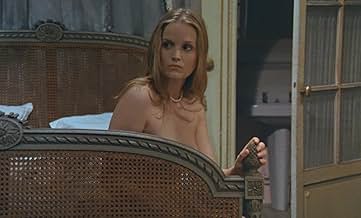La figlia di un uomo d'affari si sta dirigendo con sua zia nella proprietà fatiscente del suo futuro marito, ignaro delle strane voci che appannano il nome della famiglia.La figlia di un uomo d'affari si sta dirigendo con sua zia nella proprietà fatiscente del suo futuro marito, ignaro delle strane voci che appannano il nome della famiglia.La figlia di un uomo d'affari si sta dirigendo con sua zia nella proprietà fatiscente del suo futuro marito, ignaro delle strane voci che appannano il nome della famiglia.
- Duc Rammendelo
- (as Dalio)
Trama
Lo sapevi?
- QuizActor Bryan Pringle once took a date to a screening of La bestia (1975) in London. She was reportedly "appalled by his taste in films."
- Citazioni
Priest: Spring is the cause of our excitement. We, frail humans, we are like animals, we suffer the laws of nature. Alas!
Pierre de l'Esperance: Happily, we have this intelligence, this heavenly gift, which enables us to fight our instincts.
- Versioni alternativeThe film was rejected for UK cinema in 1978 by the BBFC and released on video in 1988 (as "Death's Ecstasy") with around 9 minutes of distributor pre-edits. It was finally passed completely uncut for cinema and video in 2001.
- ConnessioniEdited from Racconti immorali (1973)
'The Beast' appeared approximately half way in a career spanning art house successes such as 'Blanche' (1971) to the creative nadir of 'Emmanuelle 5' (1987). Most of his films represent sensuality especially the feminine kind - being discovered as a matter of primacy then typically, explored in erotic, private rituals. The urgency at which females seek satisfaction in these works is shocking or refreshing according to one's viewpoint. Borowczyk's heroines, when apart from their lovers, typically pleasure themselves quietly in chambers, as in the 'cucumber' scene in Contes Immoraux/Immoral Tales' (1974)(A film in which the content of the flashback in here was originally to have appeared). Although they take their fulfillment, their secret fantasies are largely unexpressed. The Beast' makes explicit this process of gratification, and places sexual dreams before our eyes, most noticeably in an extended flashback sequence. This of course is done after literary precedent (albeit from a tradition typically suppressed or hidden, as in the film itself). On one level of course, Borowczyk has made a variation on Beauty and The Beast. More precisely his film has its roots firmly in the adult realm of the pre-victorian fairy tale, as well as claiming an ancestory from the verse fables which have enlivened French culture, most famously by La Fontaine.
To be honest, much of the plot of 'The Beast' is forgettable, a dramatic concoction which serves a set-up for the director's impending erotic tour-de-force. The modern story is a comedy of sexual manners, contrasting the elegance of life in the chateau with the moral squalor and hypocrisy of its inhabitants. Pierre's repeated, frustrated dalliances merely anticipate the grand inter-species coupling to come. The Marquis' plans, his shabby chateau and brutish son, the forced wedding provide so much window dressing, as stereotypical as the tales that inspired them although Mathurin (played by a suitably glum Pierre Benedetti) comes across as sensitive as well as animal. Standing out without apology, the real concerns here are like the phallic column-stump prominent in the chateau grounds, the images remaining with the viewer after the film is finished exactly those which the director intended the irrational and sexual.
Although nominally set in the twentieth century, the action of the film could with little difficulty be transposed to earlier times - the middle ages say, where the director has found inspiration before. Apart from the telephone and car, very little intrudes from the modern era. The chateau, full of sharp sounds and still silence, old wooden floors and hushed servants, has an almost institutional air. The presence of the clergy in the house paints a religious-like environment, and one where correctness and arousal go hand in hand - a scenario familiar from such other Borowczyk films as 'Interno di un convento/Behind Convent Walls' (1977). The heated harpsichord music of Scarlatti with its strong rhythmic pattern and run of impassioned semi-quavers, adds to the impression of sexual emotions scuttling free beneath the surface. Outside, the overgrown, rambling grounds have a timeless quality about them. One can almost imagine Little Red Riding Hood skipping through the trees on an errand.
Apart from the baldness of its sexual images, the reason why 'The Beast' provoked such an uproar when first released is because it is an honest, adult work. It deals with human sexuality real or imagined, with complete open handedness, admitting the pretend life without hesitation. The fantastic elements of Lucy's masturbatory day dreams, seen at length and so vividly after she reads the diary, should alert the viewer to that. Mathurin is more than just the other half of the Beauty and The Beast equation. He is symbol-made-concrete of the sexual fantasies she (and by extension, we) enjoy. The 200 year cycle of the beast's reappearance truly marks the return of the repressed', and Lucy's flashback the liberation of desire. More than this her enjoyment of lustful fantasy implies how much we should become the honest brokers of our imaginations. The original view of the BBFC not withstanding, the result is then that any notion of pornography fades away in favour of recognising our true natures. Unfortunately, as Borowczyk retreated into more commercial projects, this straightforwardness disappeared to be replaced by exploitation. As a result The Beast' remains as his most striking piece of film making. After 25 years after it was made it still creates a memorable impression.
- FilmFlaneur
- 27 gen 2002
- Permalink
I più visti
- How long is The Beast?Powered by Alexa
Dettagli
- Tempo di esecuzione1 ora 38 minuti
- Mix di suoni
- Proporzioni
- 1.66 : 1
Contribuisci a questa pagina






